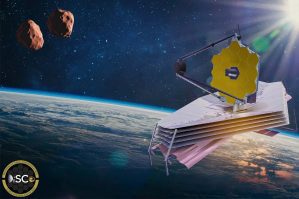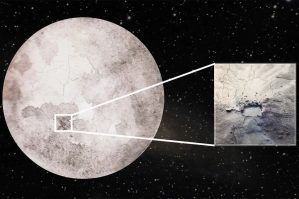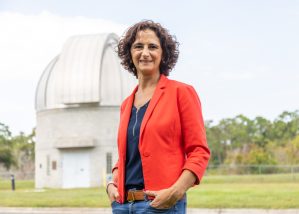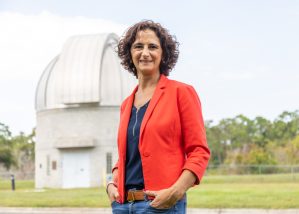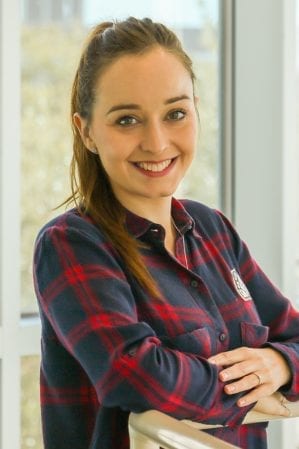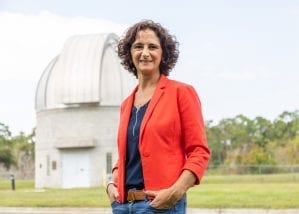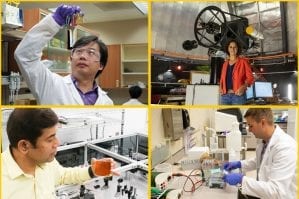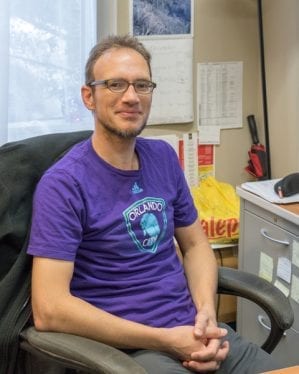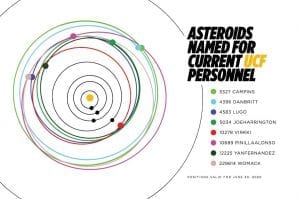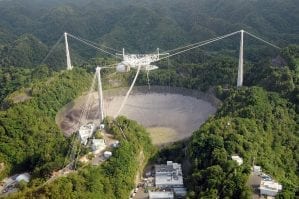-
UCF Student’s Primitive Asteroids Work Provides Context for Further Research, Future NASA Missions
The primitive asteroids that UCF physics doctoral student Brittany Harvison studies carry with them traces of their origins and billions of years of our solar system’s history. Harvison recently pored through a library of infrared telescope data to analyze the spectral composition of 25 members of the Erigone family of primitive asteroids and help fill […]
-
UCF Scientists Use James Webb Space Telescope to Uncover Clues About Neptune’s Evolution
A ring of icy rocks orbiting our sun just beyond Neptune may give us a glimpse of how Neptune — and other objects in the outskirts of our solar system — were formed. Mors-Somnus, a binary duo comprised of a pair of icy asteroids bound by gravity, was recently concluded to have originated within the […]
-
UCF Researchers Help Find Evidence of Geothermal Activity within Icy Dwarf Planets
University of Central Florida Florida Space Institute researchers are part of a team of scientists who have found evidence of geothermal activity within icy dwarf planets in our solar system. Using the James Webb Space Telescope, the team — led by the Southwest Research Institute and Lowell Observatory — observed geologically young methane deposits on […]
-
Florida Space Institute Scientist Recognized as 2022 Orange County Distinguished Resident
UCF planetary scientist Noemí Pinilla-Alonso was recognized as Orange County’s Distinguished Resident for 2022 during a surprise ceremony on March 28. The county says the award aims to spotlight individuals who “with their work or their actions, exemplify collaboration, innovation and inclusion.” Pinilla-Alonso became a resident of Orange County in 2015 — when she joined […]
-
UCF Scientist with Stake in James Webb Space Telescope Closely Monitoring Unfolding Mission
Planetary Scientist Noemi Pinilla-Alonso has become addicted to NASA TV because of its live feeds of the James Webb Space Telescope mission. The telescope, more than 20 years in the making and after multiple delays, launched on Dec. 25, 2021. The telescope is traveling quickly to reach its destination — 900,000 miles away from Earth […]
-
12 UCF Researchers Honored with Asteroids Named after Them
A dozen University of Central Florida space researchers were honored recently when planetary bodies were named after them. This brings the total number of current UCF researchers whose names are attached to asteroids to 19, along with another 12 former researchers. The honor comes just in time for today’s International Asteroid Day, which was started […]
-
UCF Scientist to Complete 100+ Hours of Research on James Webb Space Telescope
When the James Webb Space Telescope launches later this year, UCF researcher Noemi Pinilla Alonso will be among a select group of scientists worldwide who will have more than 100 hours of observation time awarded to conduct her work. The JWST telescope, which has been described as NASA’s next great space telescope, is a hot […]
-
UCF Funds Second Round of $1 million SEED Initiative to Support Faculty Research
Thirty-seven UCF teams will split $1 million in UCF SEED funding to conduct preliminary research the university hopes will lead to bigger individual grants from other agencies and breakthroughs in a variety of fields. The Office of Research and the Provost Office began the pilot SEED program with $1 million last year. Those recipients will […]
-
3 UCF Researchers Part of Nature Astronomy Articles Chronicling Spitzer Space Telescope Legacy
To understand the significance of the Spitzer Space Telescope on the understanding of our solar system, think of what the steam engine meant for the industrial revolution. A national team of scientists today published in the journal Nature Astronomy two papers that provide an inventory of the major discoveries made possible thanks to Spitzer and […]
-
National Asteroid Day: A Celebration of Mysterious Small Bodies
Imagine a celestial body larger than the Statue of Liberty skyrocketing past Earth with enough energy to flatten a city. Since 2011 this has only happened once, and it occurred earlier this month. Asteroids are small bodies, often made up of rock, that exist in the solar system. Where did they come from? Scientists speculate […]
-
UCF on Track to Become National Leader in Space Research
When the University of Central Florida took the helm of the Arecibo Observatory in Puerto Rico on April 1, the university entered a new era. “We are forging new ground for UCF,” said Elizabeth Klonoff, vice president for research and dean of the College of Graduate Studies. “We already have outstanding research in planetary sciences, […]


